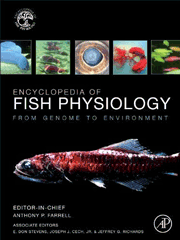
Impressum
Kundeninformation
 |
|
|||
Encyclopedia of Fish Physiology |
Kontakt/Bestellung |
|
From Genome to Environment |
|
|
Online |
|
|
Inhalt :: Content Umfassende, internationale Fachenzyklopädie mit über 300 ausführlichen, begutachteten Beiträgen zur Physiologie der Fische. Thematisch gegliedert in die Teilbereiche funktionale, thematische, phylogenetische Physiologie sowie Genomik der Fische werden traditionelle Themen wie Reproduktion, Atmung, Neuophysiologie, Endokrinologie, Nieren- und Herz-Kreislauf-Funktionen, Säure-Basen-Balance, Osmo- und Ionenregulation, Verdauung, Stoffwechsel und Fortbewegung ebenso behandelt wie Toxikologie, Migrationen und Endothermie oder die Eignung und Verwendung der genetischen Komponente der Physiologie der Fische als Modell-Lebewesen für die Erforschung von Krankheiten, Stress und physiologischen Anpassungen und Reaktionen auf äußere Bedingungen. |
 |
|
Verlag :: Publisher Elsevier Science |
|
|
Preis :: Price Preise auf Anfrage / Prices on request |
|
|
Das Angebot richtet sich nicht an Verbraucher i. S. d. § 13 BGB und Letztverbraucher i. S. d. PAngV. |
|
|
ISBN/ISSN 978-0-08-092323-9 Bestellnummer bei digento :: digento order number 10226008 |
|
|
Verlagsinformation :: Publisher's information Fish form an extremely diverse group of vertebrates. At a conservative estimate at least 40 percent of the world's vertebrates are fish. On the one hand they are united by their adaptations to an aquatic environment and on the other they show a variety of adaptations to differing conditions - often to extremes of temperature, salinity, oxygen level and water chemistry. They exhibit an array of behavioural and reproductive systems. This four volume encyclopedia covers the diversity of fish physiology in over 300 articles and provides entry level information for students and summary overviews for researchers alike. Broadly organised into four themes, articles cover Functional, Thematic, and Phylogenetic Physiology, and Fish Genomics. Functional articles address the traditional aspects of fish physiology that are common to all areas of vertebrate physiology including: Reproduction, Respiration, Neural (Sensory, Central, Effector), Endocrinology, Renal, Cardiovascular, Acid-base Balance, Osmoregulation, Ionoregulation, Digestion, Metabolism, Locomotion, and so on. Thematic Physiology articles are carefully selected and fewer in number. They provide a level of integration that goes beyond the coverage in the Functional Physiology topics and include discussions of Toxicology, Air-breathing, Migrations, Temperature, Endothermy, etc. Phylogenetic Physiology articles bring together information that bridges the physiology of certain groupings of fishes where the knowledge base has a sufficient depth and breadth and include articles on Ancient Fishes, Tunas, Sharks, etc. Genomics articles describe the underlying genetic component of fish physiology and highlight their suitability and use as model organisms for the study of disease, stress and physiological adaptations and reactions to external conditions. Audience
|
|